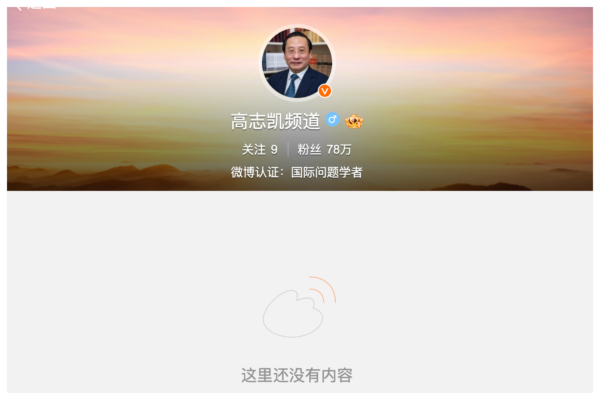Recently, in an interview with Al Jazeera, senior official and think tank member of the Chinese Communist Party (CCP), Victor Gao, raised a series of sensitive issues such as the ongoing internal conflict in China and human rights in Xinjiang. Shortly after, Gao’s Weibo account was cleared.
On August 10, Al Jazeera host Mehdi Hasan interviewed scholar Victor Gao, titled “Is China under Xi Jinping heading towards war?” Gao’s views sparked controversies among viewers.
Netizens commented, “His English is good, but it’s still the CCP’s rhetoric.” “Even the freedom of speech in Qatar is leagues ahead of China.” “This Director Gao is being satirical. Case closed.” “Freedom of speech in mainland China is a one-time deal, once used, you may disappear. We will miss him.”
Gao, a lawyer and international affairs scholar who currently serves as the Deputy Director of the China Institute of Globalization, was also an English translator for Deng Xiaoping.
Host Hasan pointed out that the CCP has been increasing military spending for 29 consecutive years and escalated military exercises in the Taiwan Strait since 2022. He mentioned the increasing tension following the election of Taiwan’s new president, with CCP warships and drones intruding into Taiwan’s airspace daily, along with cyber-attacks on the island.
When asked about whether the CCP is preparing to invade Taiwan and why Taiwan shouldn’t maintain its status quo, Gao mentioned, “The exact status between the two sides is an unfinished civil war since 1949.” He emphasized the need to defend sovereignty and territorial integrity, stating that every inch of land is essential.
Gao broadcasted the beginning of the interview on his Weibo channel on the 11th, reiterating his support for “unification,” whether through peaceful or non-peaceful means.
In the interview and Q&A session, Gao repeatedly stressed that the CCP does not allow independence for Taiwan, Xinjiang, or Tibet. Otherwise, one may disappear, be unable to return home, or even talk to their 82-year-old mother.
Independent scholar Wu Zuolai emphasized in an interview that the issue of civil war had been raised before. He stated that the civil war label meant that “liberating Taiwan” is an internal matter, intervening from other countries would constitute interference in domestic affairs, as wars between nations need to go through the United Nations.
Regarding the sensitivity of the independence issue in China, Wu explained that during the political consultation conference, it was decided that regions like Xinjiang, Tibet, and Inner Mongolia, with autonomous status, were relatively independent and highly autonomous. Mao Zedong dismantled this autonomy, with the party secretary ranking above local government chairmen.
He further commented that the CCP has betrayed the attributes of the republic and the national autonomy agreed upon during the political consultation conference. The current regime undermines “one country, two systems” in Hong Kong and seeks to forcibly unify Taiwan under CCP’s one-party rule, affecting mainland China’s political security.
Regarding the Taiwan issue, Wu believed Gao’s stance was merely a declaration, as China’s military would find it challenging to cooperate due to the chaotic situation within the regime.
On the issue of independence, Wu highlighted the potential benefits if mainland China were a democracy under a federal system. He emphasized that Taiwan’s people would likely join, contributing to a safer and more democratic nation, contrasting CCP’s authoritarian rule.
According to reports from Voice of America, the Foundation for Defense of Democracies (FDD) conducted a tabletop exercise in Taiwan last month to explore options for countering CCP’s economic and cyber warfare against Taiwan. Craig Singleton, head of the FDD China Project, believed that Xi Jinping was willing to incur higher costs and take greater economic risks to achieve certain national security goals.
Discussing Gao’s situation, it was remarked that in China, critiquing the CCP and Xi Jinping could lead to swift repercussions, as people are only allowed constructive criticisms within limited boundaries, such as in aging populations or demographic structures.
Gao, under further questioning by the host, cryptically mentioned the disappearance of a certain individual, indicating the consequences of crossing CCP’s red lines. He humorously commented, “If I disappear, I hope you will bail me out.”
Notably, shortly after Gao uploaded the interview video on Weibo, his account was cleared before or on August 13th.
Regarding individuals within the CCP system, Wu believed that many were apprehensive about speaking the truth but felt compelled to give politically correct responses during interviews. They exhibited a sense of fear and dependency on the party’s ideology and leadership.
From a scholarly standpoint, Gao’s cautious navigation within high circles of the CCP reflected his acute political sensitivity. Given his current role in a civilian think tank, his words may carry a mix of truths and half-truths, summarizing the challenging landscape of criticizing the autocratic regime.
In conclusion, scholars like Gao, with their delicate dance within the CCP’s echelons, showcase the complexities of navigating internal politics while engaging with Western counterparts. Their considerations may encompass preserving an exit strategy within Western circles, adding further intricacy to the diplomatic entanglements.

